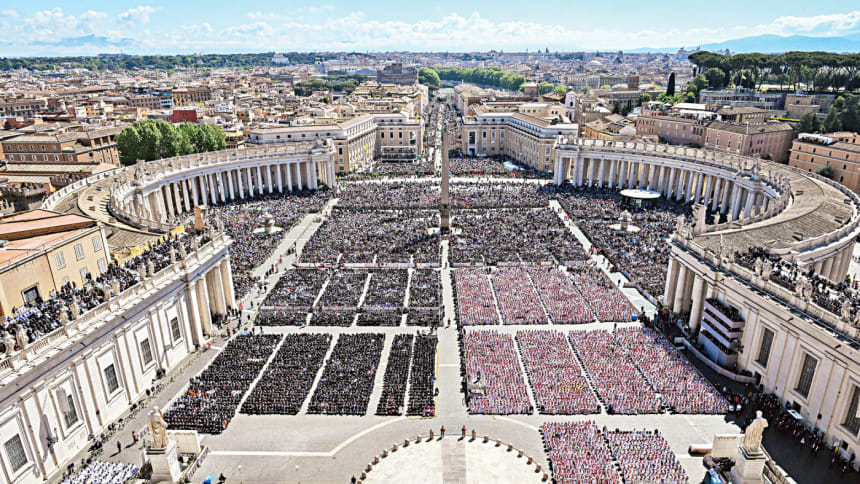The world bids farewell to the ‘Pope of the poor’

Hundreds of thousands of mourners yesterday joined world leaders, including US President Donald Trump, to bid farewell to Pope Francis, a champion of the poor who strived to forge a more compassionate Catholic church.
The Vatican said 400,000 people packed St Peter's Square and lined the streets of Rome for the funeral of the first Latin American leader of the world's 1.4 billion Catholics.
After a solemn funeral, the Argentine pontiff's plain wooden coffin -- a testament to a life of humility -- was driven slowly to Rome's Santa Maria Maggiore church, where he was interred in a private ceremony.
Cardinals marked his coffin with red wax seals before it was lowered into a tomb set inside an alcove, according to images released by the Vatican.
Fourteen white-gloved pallbearers carried the coffin into the church, as children placed baskets of flowers at the altar and a choir sang prayers.
The marble tomb is inscribed with just one word: "Franciscus", his papal name in Latin.
Trump was among more than 50 heads of state at the funeral. He met several world leaders in a corner of the St Peter's basilica before, notably Ukraine's President Volodymyr Zelensky, in their first face-to-face meeting since their Oval Office clash in February.
Francis, who died on Monday aged 88, was "a pope among the people, with an open heart", who strove for a more compassionate, open-minded Catholic Church, said Cardinal Giovanni Battista Re, who led the service.
There was applause from the masses gathered under bright blue skies as he hailed the pope's "conviction that the Church is a home for all, a home with its doors always open".
Francis sought to steer the Church into a more inclusive direction during his 12-year-long papacy, and his death prompted a global outpouring of emotion.
Italian and Vatican authorities mounted a major security operation for the ceremony, with fighter jets on standby and snipers positioned on the roofs surrounding the tiny city-state.
Red-robed cardinals and purple-hatted bishops sat on one side of the altar in St Peter's Square during the funeral, with world dignitaries sitting opposite.
In front of the altar lay the pope's simple cypress coffin, inlaid with a pale cross.
The funeral set off nine days of official Vatican mourning for Francis, who took over following the resignation of Pope Benedict XVI in 2013.
After the mourning, cardinals aged under 80 will elect a new pope from among their number.
Many of Francis's reforms angered traditionalists, while his criticism of injustices, from the treatment of migrants to the damage wrought by global warming, riled many world leaders.
Yet the former archbishop of Buenos Aires's compassion and charisma earned him global affection and respect.
Trump's administration drew the pontiff's ire for its mass deportation of migrants, but the president has paid tribute to "a good man" who "loved the world".
Chief Adviser Professor Muhammad Yunus also paid his respects to Pope Francis in the Vatican City as he joined the funeral mass of the late Pope.
The Bangladesh chief adviser was greeted by senior officials of the Vatican as he entered St Peter's Basilica, where the mortal remains of the Pope were lying in state.
He stood in solemn silence in front of the coffin for a while to pay his last homage to the late Pope. Prof Yunus then joined the two-hour-long funeral mass along with other world leaders.
Trump's predecessor, Joe Biden also attended the funeral, alongside UN Secretary General Antonio Guterres, Germany's Olaf Scholz, Italy's Giorgia Meloni, and Lebanon's Joseph Aoun.
Israel -- angered by Francis's criticism of its war in Gaza -- sent only its Holy See ambassador. China, which does not have formal relations with the Vatican, did not send any representatives.
Francis died of a stroke and heart failure less than a month after he left the hospital where he had battled pneumonia for five weeks.
The Church's 266th pope loved nothing more than being among his flock, taking selfies with the faithful and kissing babies, and made it his mission to visit the peripheries, rather than mainstream centres of Catholicism.
His last public act, the day before his death, was an Easter Sunday blessing to the world, ending his papacy as he had begun it -- with an appeal to protect the "vulnerable, the marginalised and migrants".
Francis's admirers credit him with transforming perceptions of the Church and helping revive the faith following decades of clerical sex abuse scandals.
He was considered a radical by some for allowing divorced and remarried believers to receive communion, approving the baptism of transgender believers and blessings for same-sex couples, and refusing to judge gay Catholics.
But he also stuck with some centuries-old dogma, notably holding firm on the Church's opposition to abortion.

 For all latest news, follow The Daily Star's Google News channel.
For all latest news, follow The Daily Star's Google News channel. 



Comments